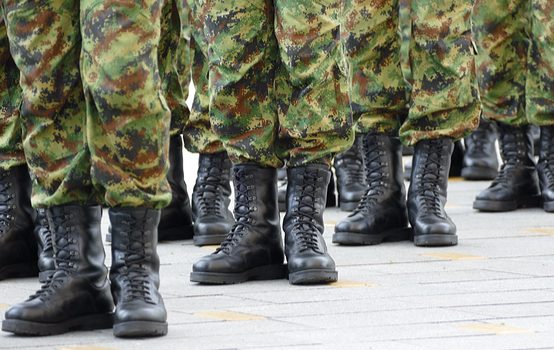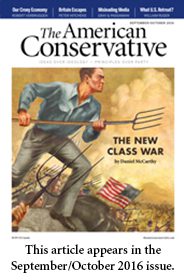Does the U.S. Need ‘Deep Engagement’?

The new book from Stephen Brooks and William Wohlforth might be unsettling to readers accustomed to encountering the hawks who typically populate the media. Unlike them, the authors of America Abroad admit that the United States has made mistakes abroad, they reckon with the reality of failed policies, and they consider other countries’ perspectives. Try to imagine William Kristol or Fred Barnes advocating an assertive American foreign policy but conceding that “the United States has at least its fair share of flaws, and, given its outsized role in the world, those flaws can produce negative ramifications; the aftermath of the 2003 invasion is arguably the most dramatic recent example but there are obviously many others.”
America Abroad’s arguments are strengthened considerably by its nuance and fairness. Indeed, even those of us who favor a foreign policy guided by more restraint may admit that Brooks and Wohlforth have produced perhaps the most convincing defense of American power since the Cold War ceased. It at least ranks with Joseph Nye’s Bound to Lead and Zbigniew Brzezinski’s The Grand Chessboard in that regard. Those who have followed the authors’ careers will not be surprised at the quality of this work. Political scientists at Dartmouth, they are best known for a series of journal articles arguing that American preeminence is resilient and a positive force for the U.S. and the world.
In writings that culminated in their 2008 book World Out of Balance, Brooks and Wohlforth refuted foreign-policy realists’ belief that rival states would try to balance American power. The reality was that America was so predominant, geographically isolated, and legitimized in its global leadership that it would remain the lone superpower for decades. World Out of Balance didn’t pretend that America was more virtuous than other nations or that it was capable of endless wonders. The book simply declared that the structural conditions of the international system meant that the U.S. would lead the world for years to come, for better or worse. Like Mark Twain’s death, rumors of American decline were greatly exaggerated.
This new book picks up where World Out of Balance left off. Brooks and Wohlforth outline here what they think America should do in a world where it is predominant and likely to remain so for at least a generation. They propose a strategy they call “deep engagement.” It would prioritize three overlapping objectives in Europe, Asia, and the Middle East: reducing threats to U.S. national security, promoting a liberal economic order, and fostering international institutions. These have been the priorities of all presidential administrations since World War II, they write. Meanwhile, “concerns about other priorities such as democracy promotion, human rights, and humanitarian intervention have waxed and waned between administrations and even sometimes within them.”
America Abroad is helpful reading for anyone who thinks the country’s current woes will translate into a decline in international power. U.S. economic, diplomatic, and military might dwarfs that of China, the next-best competitor. The authors make the important point that a state needs to undertake high-tech defense spending consistently for decades to reach the top levels: even if China were at parity with America in every area, time alone would preclude the two countries from being equally powerful because of America’s tech edge.
Most interesting is their explanation for why the U.S. kept intact its massive military—which was built to fight Imperial Japan, Nazi Germany, and the Soviet Union—once those foes were gone. For some analysts, such as Chalmers Johnson, the decision to maintain America’s dominant posture was evidence that a desire for empire, not fears of the Soviets or other strategic considerations, was what had truly motivated decision-makers for a half-century.
Brooks and Wohlforth contend that policymakers kept America’s massive foreign-policy structure together because it proved helpful in dealing with the problems in the immediate post-Cold War environment: reunifying Germany, assuring the transition to democracy among states in Eastern and Central Europe after communism, and so forth. Holding on to security commitments established during the Cold War makes sense if they make the regions more secure and prevent rival hegemons from emerging, Brooks and Wohlforth argue. “U.S. alliances always served not only as capability-aggregating mechanisms against potential adversaries but also as tools for controlling risks and exerting influence among its allies,” they write. “The Cold War’s end and the Soviet Union’s dissolution simply caused the balance to swing toward the latter two functions.” No other work has outlined the logic of American foreign policy in quite this way.
Although they see America’s position as durably preeminent, Brooks and Wohlforth are not maximalists. “Those who advocate ambitious projects to assertively spread democracy and liberal principles and foster dramatic improvements in human rights, by the sword if necessary, make the same mistake as proponents of pulling back: they fail to appreciate the major benefits America obtains by sustaining its long-standing grand strategy,” they write. They have harsh words for the George W. Bush administration and believe the U.S. could best exploit the current moment by building new, favorable international institutions in the way Harry Truman and his advisors did in the late 1940s.
And yet, for all their success in forcing readers to examine U.S. policy in new ways, their policy proposals are not as persuasive as their analyses. For one thing, they overstate the differences between their ideas and those of their critics. For instance, they write that the Bush administration’s troop buildup in the Middle East was overkill and that democracy promotion and nation-building are unattainable goals. They state that even the troop levels from 1991–2002 may have been too much. This is not “deep engagement,” as everyone but the authors would understand the term. Given that their policies, if implemented, would involve a scaling back of troop levels in the Middle East, it seems strange for them simultaneously to argue that they do not want the U.S. to retreat from its existing programs in any capacity.
America Abroad also overstates the benefits of deep engagement and understates the costs. In a throwaway line, for instance, the authors state that “the era of major interstate wars between Israel and its neighbors would likely not have ended, or have ended so soon, without U.S. engagement in the region.” It is unclear why this is necessarily so: America has significant leverage even in areas where it doesn’t have a significant presence, such as Africa. Its immense strength doesn’t need to be deployed or demonstrated to be understood by players around the world. Conversely, the U.S. has paid a significant strategic price for underwriting the security of Israel and Saudi Arabia, with upshots ranging from inflaming terrorism to suffering gas shortages in the 1970s. America Abroad downplays the role U.S. troops play in igniting anti-Americanism in the Middle East, painting it as virtually irrelevant to terrorists’ motives. Given that American boots on the ground in Saudi Arabia inspired the creation of al-Qaeda, this is simply unconvincing.
 Similarly, Brooks and Wohlforth underestimate the importance of the temptations policymakers face to use the massive military at their disposal. Wars like Vietnam and Iraq are not small miscalculations but brutal mistakes that cost a tremendous price in human lives, both Americans’ and others’. Losing wars can be psychologically catastrophic for countries as well, experiences that frequently serve as preludes to revolutions. The authors’ confidence in an “Iraq syndrome” that inhibits Americans’ use of force seems misplaced given how many Republicans have recently called for troop increases in Iraq to defeat the Islamic State. If there was a Vietnam Syndrome, it didn’t last very long—certainly not long enough. Any Iraq Syndrome that exists could prove to be equally short-lived.
Similarly, Brooks and Wohlforth underestimate the importance of the temptations policymakers face to use the massive military at their disposal. Wars like Vietnam and Iraq are not small miscalculations but brutal mistakes that cost a tremendous price in human lives, both Americans’ and others’. Losing wars can be psychologically catastrophic for countries as well, experiences that frequently serve as preludes to revolutions. The authors’ confidence in an “Iraq syndrome” that inhibits Americans’ use of force seems misplaced given how many Republicans have recently called for troop increases in Iraq to defeat the Islamic State. If there was a Vietnam Syndrome, it didn’t last very long—certainly not long enough. Any Iraq Syndrome that exists could prove to be equally short-lived.
“The core solution to temptation lies at home, not in America’s grand strategy abroad,” Brooks and Wohlforth write. There have to be better domestic constraints on when leaders can use the military, according to them. Let’s be clear: if the 2016 election season shows anything, it is that American institutions are deeply flawed and that they are incapable of strengthening any checks on the executive branch, especially when it comes to foreign policy. The nominee of one party has not indicated she favors any shedding of executive power, and her opponent has suggested he would act something like a king. To call Brooks and Wohlforth’s ideas on this point unrealistic is putting it favorably.
Ultimately, America Abroad is far better at redefining international-relations theory for a unipolar era than it is at extracting from that theory to offer suggestions for moving forward. But any reader who favors a more restrained foreign policy will have to at least reckon with this book; he will come away better for it.
Jordan Michael Smith is the author of the Kindle Single “Humanity: How Jimmy Carter Lost an Election and Transformed the Post-Presidency.’’
Comments